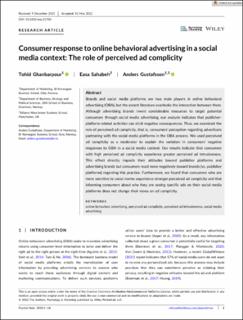Consumer response to online behavioral advertising in a social media context: The role of perceived ad complicity
Peer reviewed, Journal article
Published version
Permanent lenke
https://hdl.handle.net/11250/2999528Utgivelsesdato
2022Metadata
Vis full innførselSamlinger
- Scientific articles [2181]
Sammendrag
Brands and social media platforms are two main players in online behavioraladvertising (OBA), but the extant literature overlooks the interaction between them.Although advertising brands invest considerable resources to target potentialconsumers through social media advertising, our analysis indicates that publisher‐platform‐related activities can elicit negative consequences. Thus, we examined therole of perceived ad complicity, that is, consumers' perception regarding advertiserspartnering with the social media platforms in the OBA process. We used perceivedad complicity as a moderator to explain the variation in consumers' negativeresponses to OBA in a social media context. Our results indicate that consumerswith high perceived ad complicity experience greater perceived ad intrusiveness.This effect directly impacts their attitudes toward publisher platforms andadvertising brands but consumers react more negatively toward brands (vs. publisherplatforms) regarding this practice. Furthermore, we found that consumers who aremore sensitive to social norms experience stronger perceived ad complicity and thatinforming consumers about why they are seeing specific ads on their social mediaplatforms does not change their views on ad complicity.

